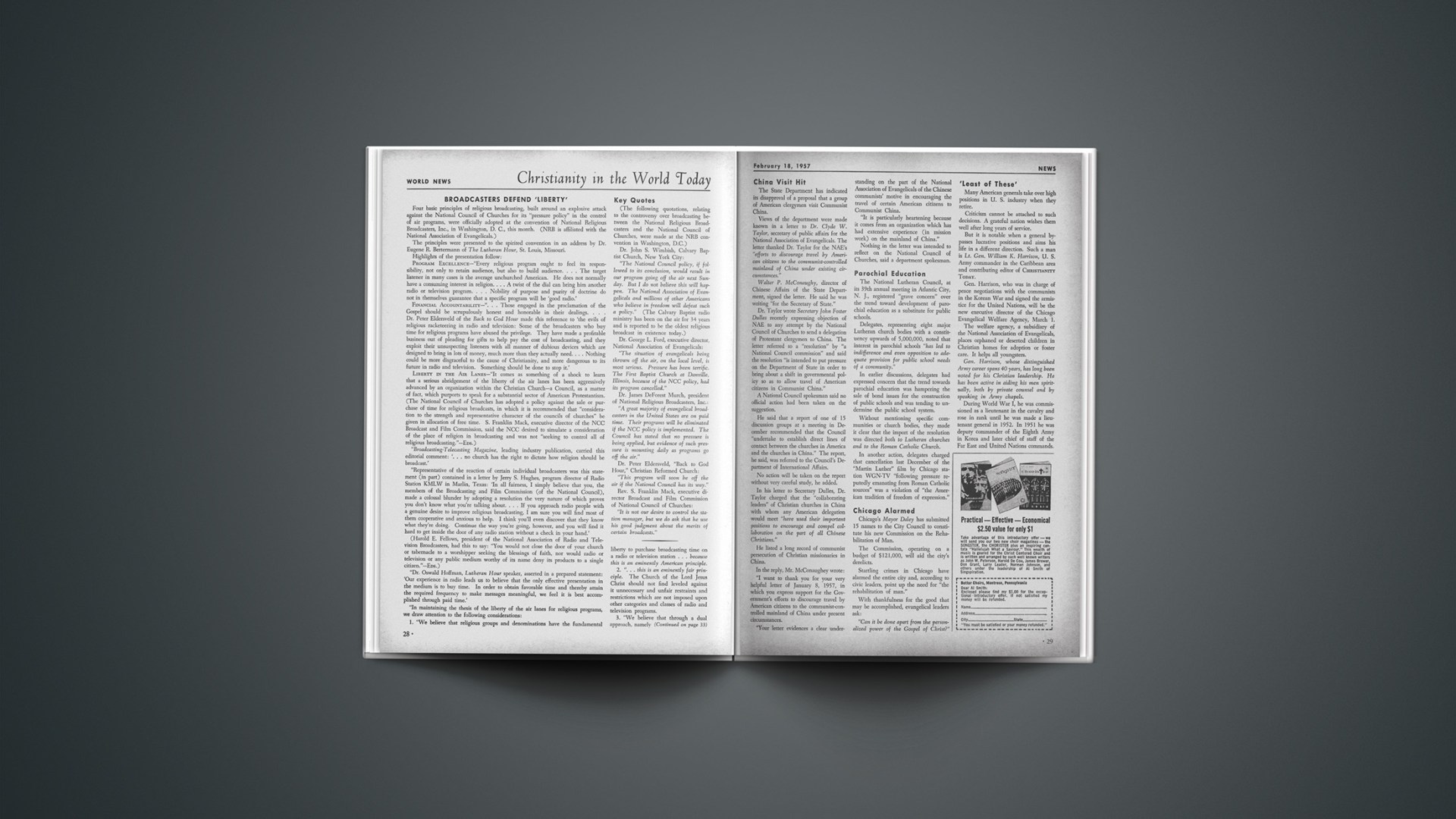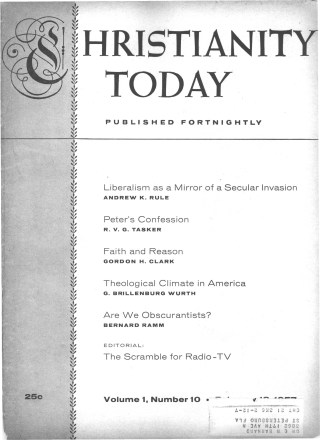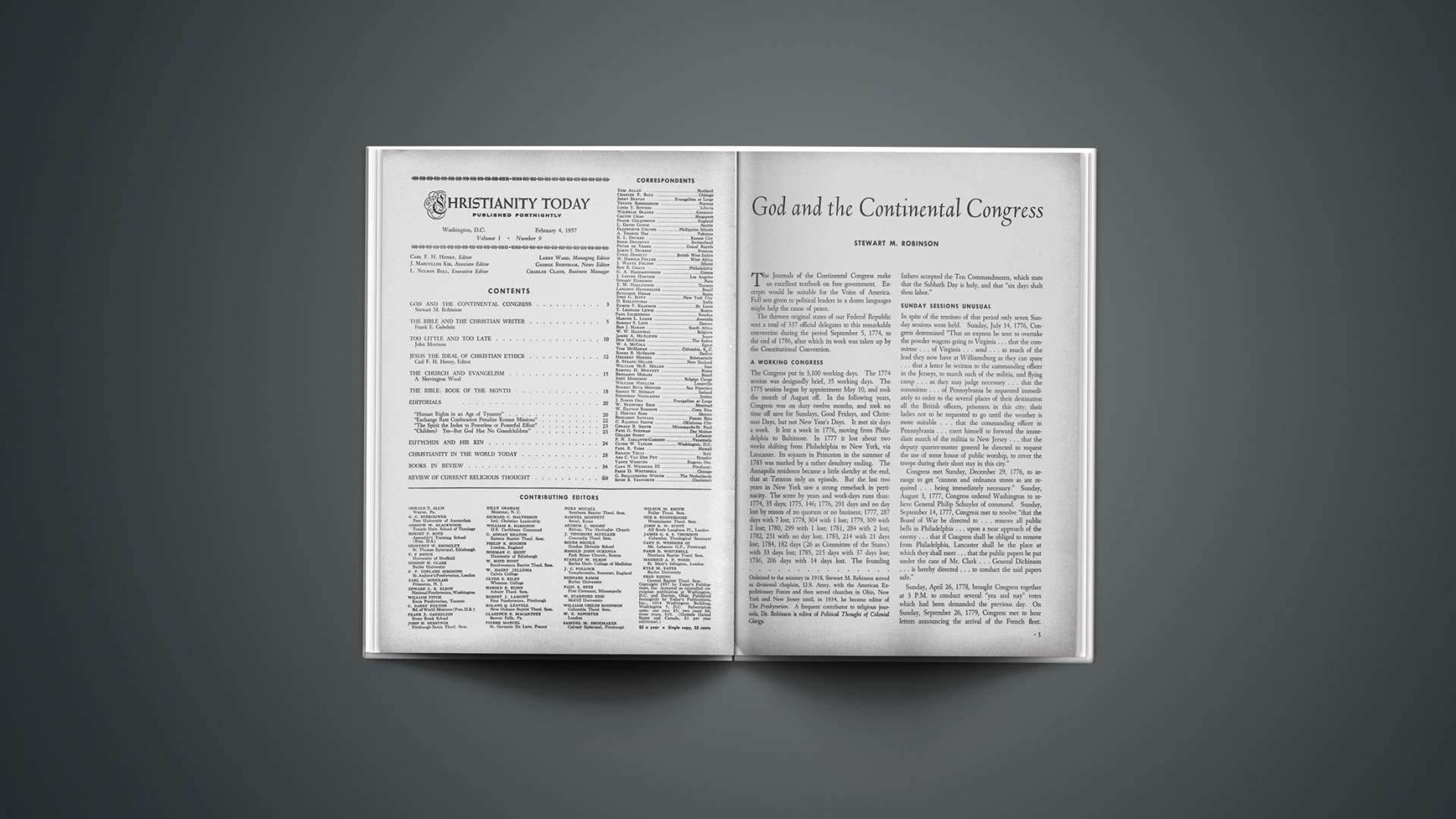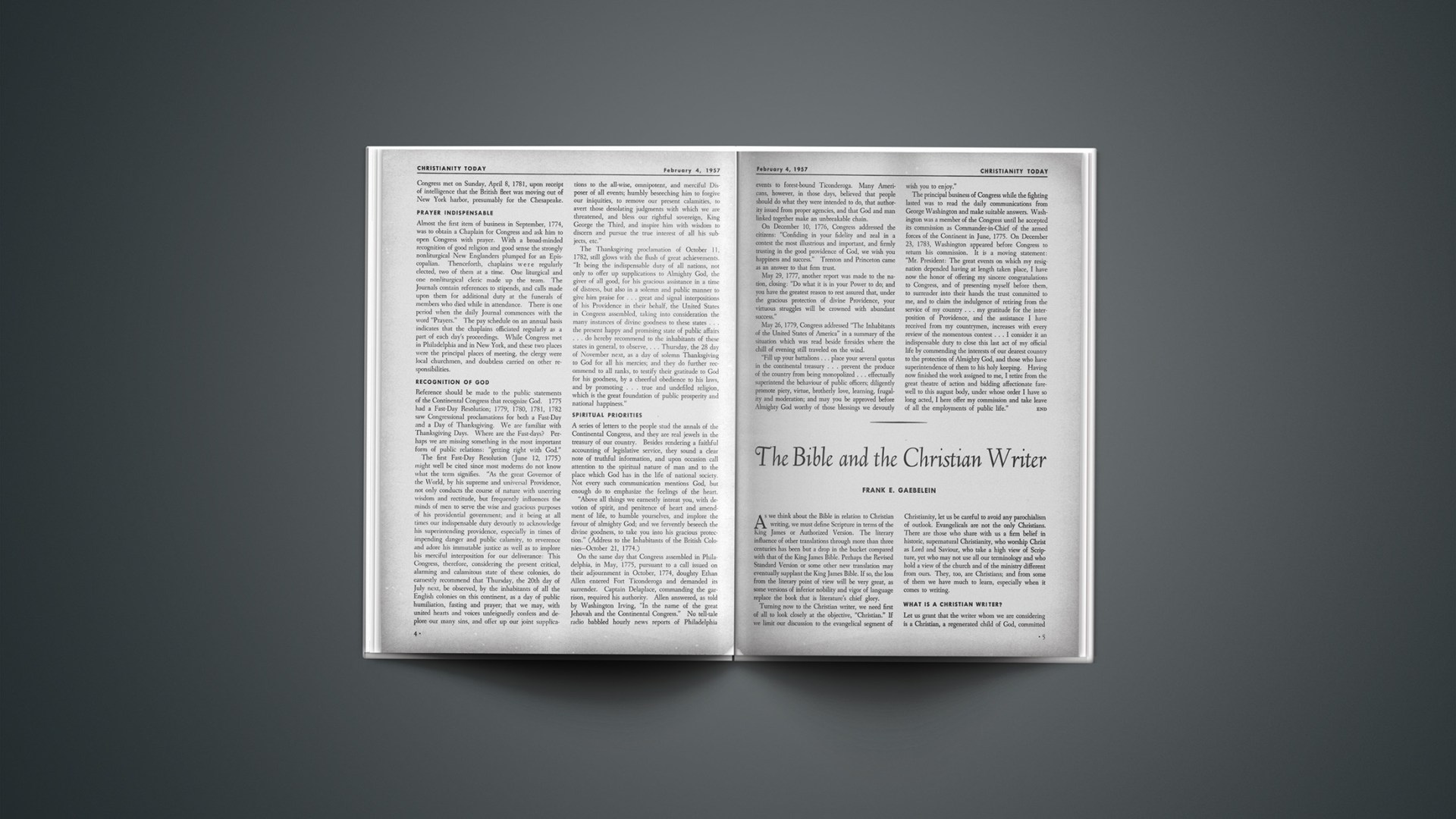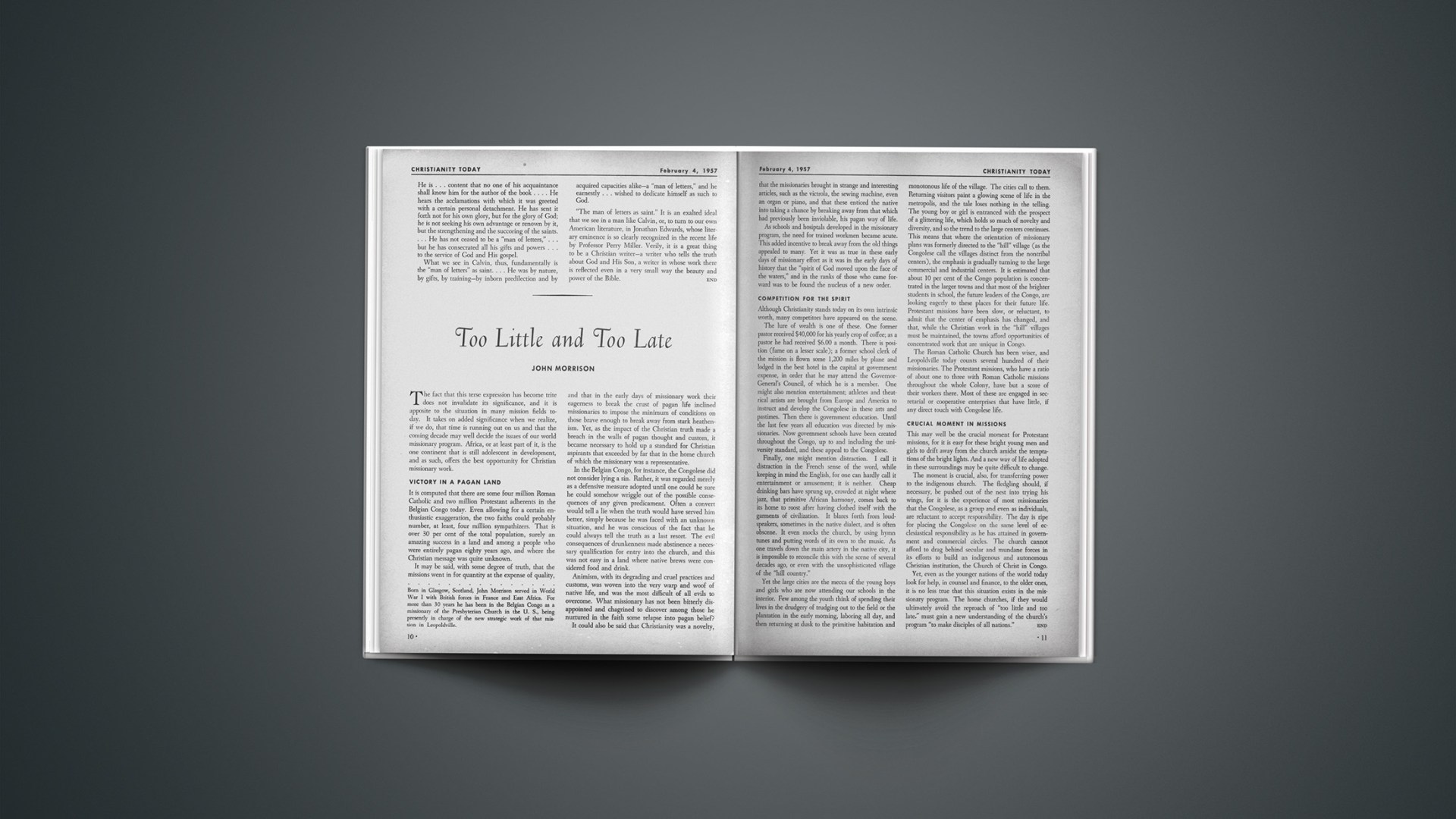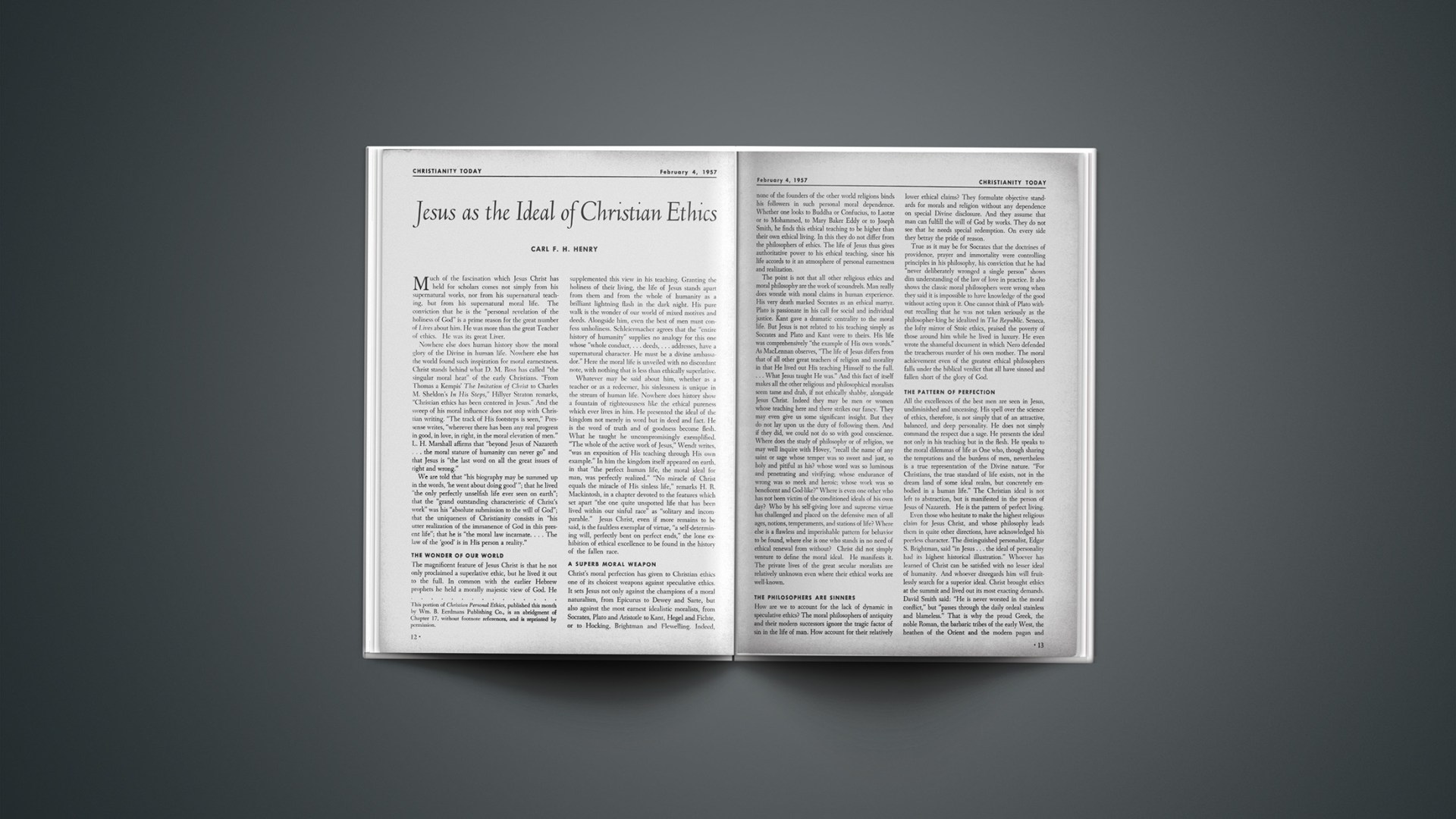WORD NEWS
Christianity in the World Today
Four basic principles of religious broadcasting, built around an explosive attack against the National Council of Churches for its “pressure policy” in the control of air programs, were officially adopted at the convention of National Religious Broadcasters, Inc., in Washington, D. C., this month. (NRB is affiliated with the National Association of Evangelicals.)
The principles were presented to the spirited convention in an address by Dr. Eugene R. Bertermann of The Lutheran Hour, St. Louis, Missouri.
Highlights of the presentation follow:
PROGRAM EXCELLENCE—“Every religious program ought to feel its responsibility, not only to retain audience, but also to build audience.… The target listener in many cases is the average unchurched American. He does not normally have a consuming interest in religion.… A twist of the dial can bring him another radio or television program.… Nobility of purpose and purity of doctrine do not in themselves guarantee that a specific program will be ‘good radio.’
FINANCIAL ACCOUNTABILITY—“… Those engaged in the proclamation of the Gospel should be scrupulously honest and honorable in their dealings.… Dr. Peter Eldersveld of the Back to God Hour made this reference to ‘the evils of religious racketeering in radio and television: Some of the broadcasters who buy time for religious programs have abused the privilege. They have made a profitable business out of pleading for gifts to help pay the cost of broadcasting, and they exploit their unsuspecting listeners with all manner of dubious devices which are designed to bring in lots of money, much more than they actually need.… Nothing could be more disgraceful to the cause of Christianity, and more dangerous to its future in radio and television. Something should be done to stop it.’
LIBERTY IN THE AIR LANES—“It comes as something of a shock to learn that a serious abridgement of the liberty of the air lanes has been aggressively advanced by an organization within the Christian Church—a Council, as a matter of fact, which purports to speak for a substantial sector of American Protestantism. (The National Council of Churches has adopted a policy against the sale or purchase of time for religious broadcasts, in which it is recommended that “consideration to the strength and representative character of the councils of churches” be given in allocation of free time. S. Franklin Mack, executive director of the NCC Broadcast and Film Commission, said the NCC desired to simulate a consideration of the place of religion in broadcasting and was not “seeking to control all of religious broadcasting.”—EDS.)
“Broadcasting-Telecasting Magazine, leading industry publication, carried this editorial comment: ‘… no church has the right to dictate how religion should be broadcast.’
“Representative of the reaction of certain individual broadcasters was this statement (in part) contained in a letter by Jerry S. Hughes, program director of Radio Station KMLW in Marlin, Texas: ‘In all fairness, I simply believe that you, the members of the Broadcasting and Film Commission (of the National Council), made a colossal blunder by adopting a resolution the very nature of which proves you don’t know what you’re talking about.… If you approach radio people with a genuine desire to improve religious broadcasting, I am sure you will find most of them cooperative and anxious to help. I think you’ll even discover that they know what they’re doing. Continue the way you’re going, however, and you will find it hard to get inside the door of any radio station without a check in your hand.’
(Harold E. Fellows, president of the National Association of Radio and Television Broadcasters, had this to say: “You would not close the door of your church or tabernacle to a worshipper seeking the blessings of faith, nor would radio or television or any public medium worthy of its name deny its products to a single citizen.”—EDS.)
“Dr. Oswald Hoffman, Lutheran Hour speaker, asserted in a prepared statement: ‘Our experience in radio leads us to believe that the only effective presentation in the medium is to buy time. In order to obtain favorable time and thereby attain the required frequency to make messages meaningful, we feel it is best accomplished through paid time.’
“In maintaining the thesis of the liberty of the air lanes for religious programs, we draw attention to the following considerations:
1. “We believe that religious groups and denominations have the fundamental liberty to purchase broadcasting time on a radio or television station … because this is an eminently American principle.
2. “… this is an eminently fair principle. The Church of the Lord Jesus Christ should not find leveled against it unnecessary and unfair restraints and restrictions which are not imposed upon other categories and classes of radio and television programs.
3. “We believe that through a dual approach, namely the utilization of both sustaining and paid radio and television time, religious programming will be able to serve a greater aggregate amount of radio and television time.
4. “The purchase of time for a religious message gives the Church more direct control of religious content and the ability to speak out more clearly and forthrightly in its religious message.
5. “We believe that the principle of purchasing broadcasting time will help secure more advantageous time slots.…
6. “The principle of purchasing time … is an important one for certain religious broadcasters also in the light of the fact that they conduct an international operation.
7. “It is a matter of historical record that in most cases the National Council of Churches has favored broadcasters and accorded sustaining radio time on the networks of America to men who publicly denied the fundamental truths of the Christian faith, such as, the inspiration and inerrancy of Holy Scriptures, the Virgin Birth and deity of our Lord Jesus Christ, his suffering and death for the sins of mankind, his resurrection from the dead and his second coming on the last day to judge the living and the dead. Evangelical Christians cannot believe that these men in any sense represent them or, for that matter, the fundamental message of historic Protestant Christianity in America. On the contrary, they feel constrained to do all in their power to see to it that such a denial of the historic Protestant faith and of the very foundation doctrines of Holy Scriptures be countered with a positive proclamation of Bible truth.…
FIDELITY TO THE FAITH—“The broadcasters represented here must for reasons of conscience steadfastly oppose every denial, perversion, or dilution of the historic Christian faith as set forth on the pages of God’s inspired Word. They can have no part in the setting forth of ‘another Gospel,’ ‘teaching for doctrines the commandments of men.’ They recall Saint Paul’s sweeping denunciation of all who falsify or pervert the true Gospel: ‘Though we, or an angel from heaven, preach any other Gospel unto you than that which we have preached unto you, let him be accursed. As we said before, so say I now again, if any man preach any other Gospel unto you, than that ye have received, let him be accursed.’ ”
Key Quotes
(The following quotations, relating to the controversy over broadcasting between the National Religious Broadcasters and the National Council of Churches, were made at the NRB convention in Washington, D.C.)
Dr. John S. Wimbish, Calvary Baptist Church, New York City:
“The National Council policy, if followed to its conclusion, would result in our program going off the air next Sunday. But I do not believe this will happen. The National Association of Evangelicals and millions of other Americans who believe in freedom will defeat such a policy.” (The Calvary Baptist radio ministry has been on the air for 34 years and is reported to be the oldest religious broadcast in existence today.)
Dr. George L. Ford, executive director, National Association of Evangelicals:
“The situation of evangelicals being thrown off the air, on the local level, is most serious. Pressure has been terrific. The First Baptist Church at Danville, Illinois, because of the NCC policy, had its program cancelled.”
Dr. James DeForest Murch, president of National Religious Broadcasters, Inc.:
“A great majority of evangelical broadcasters in the United States are on paid time. Their programs will be eliminated if the NCC policy is implemented. The Council has stated that no pressure is being applied, but evidence of such pressure is mounting daily as programs go off the air.”
Dr. Peter Eldersveld, “Back to God Hour,” Christian Reformed Church:
“This program will soon be off the air if the National Council has its way.”
Rev. S. Franklin Mack, executive director Broadcast and Film Commission of National Council of Churches:
“It is not our desire to control the station manager, but we do ask that he use his good judgment about the merits of certain broadcasts.”
China Visit Hit
The State Department has indicated its disapproval of a proposal that a group of American clergymen visit Communist China.
Views of the department were made known in a letter to Dr. Clyde W. Taylor, secretary of public affairs for the National Association of Evangelicals. The letter thanked Dr. Taylor for the NAE’s “efforts to discourage travel by American citizens to the communist-controlled mainland of China under existing circumstances.”
Walter P. McConaughy, director of Chinese Affairs of the State Department, signed the letter. He said he was writing “for the Secretary of State.”
Dr. Taylor wrote Secretary John Foster Dulles recently expressing objection of NAE to any attempt by the National Council of Churches to send a delegation of Protestant clergymen to China. The letter referred to a “resolution” by “a National Council commission” and said the resolution “is intended to put pressure on the Department of State in order to bring about a shift in governmental policy so as to allow travel of American citizens in Communist China.”
A National Council spokesman said no official action had been taken on the suggestion.
He said that a report of one of 15 discussion groups at a meeting in December recommended that the Council “undertake to establish direct lines of contact between the churches in America and the churches in China.” The report, he said, was referred to the Council’s Department of International Affairs.
No action will be taken on the report without very careful study, he added.
In his letter to Secretary Dulles, Dr. Taylor charged that the “collaborating leaders” of Christian churches in China with whom any American delegation would meet “have used their important positions to encourage and compel collaboration on the part of all Chinese Christians.”
He listed a long record of communist persecution of Christian missionaries in China.
In the reply, Mr. McConaughey wrote:
“I want to thank you for your very helpful letter of January 8, 1957, in which you express support for the Government’s efforts to discourage travel by American citizens to the communist-controlled mainland of China under present circumstances.
“Your letter evidences a clear understanding on the part of the National Association of Evangelicals of the Chinese communists’ motive in encouraging the travel of certain American citizens to Communist China.
“It is particularly heartening because it comes from an organization which has had extensive experience (in mission work) on the mainland of China.”
Nothing in the letter was intended to reflect on the National Council of Churches, said a department spokesman.
Parochial Education
The National Lutheran Council, at its 39th annual meeting in Atlantic City, N. J., registered “grave concern” over the trend toward development of parochial education as a substitute for public schools.
Delegates, representing eight major Lutheran church bodies with a constituency upwards of 5,000,000, noted that interest in parochial schools “has led to indifference and even opposition to adequate provision for public school needs of a community.”
In earlier discussions, delegates had expressed concern that the trend towards parochial education was hampering the sale of bond issues for the construction of public schools and was tending to undermine the public school system.
Without mentioning specific communities or church bodies, they made it clear that the import of the resolution was directed both to Lutheran churches and to the Roman Catholic Church.
In another action, delegates charged that cancellation last December of the “Martin Luther” film by Chicago station WGN-TV “following pressure reputedly emanating from Roman Catholic sources” was a violation of “the American tradition of freedom of expression.”
Chicago Alarmed
Chicago’s Mayor Daley has submitted 15 names to the City Council to constitute his new Commission on the Rehabilitation of Man.
The Commission, operating on a budget of $121,000, will aid the city’s derelicts.
Startling crimes in Chicago have alarmed the entire city and, according to civic leaders, point up the need for “the rehabilitation of man.”
With thankfulness for the good that may be accomplished, evangelical leaders ask:
“Can it be done apart from the personalized power of the Gospel of Christ?”
‘Least Of These’
Many American generals take over high positions in U. S. industry when they retire.
Criticism cannot be attached to such decisions. A grateful nation wishes them well after long years of service.
But it is notable when a general bypasses lucrative positions and aims his life in a different direction. Such a man is Lt. Gen. William K. Harrison, U. S. Army commander in the Caribbean area and contributing editor of CHRISTIANITY TODAY.
Gen. Harrison, who was in charge of peace negotiations with the communists in the Korean War and signed the armistice for the United Nations, will be the new executive director of the Chicago Evangelical Welfare Agency, March 1.
The welfare agency, a subsidiary of the National Association of Evangelicals, places orphaned or deserted children in Christian homes for adoption or foster care. It helps all youngsters.
Gen. Harrison, whose distinguished Army career spans 40 years, has long been noted for his Christian leadership. He has been active in aiding his men spiritually, both by private counsel and by speaking in Army chapels.
During World War I, he was commissioned as a lieutenant in the cavalry and rose in rank until he was made a lieutenant general in 1952. In 1951 he was deputy commander of the Eighth Army in Korea and later chief of staff of the Far East and United Nations commands.
‘Luther’ Tv Protest
Senator Warren Magnuson (D-Wash.), chairman of the Senate Interstate and Foreign Commerce Committee, expressed an opinion that the Federal Communications Commission has authority to handle an official complaint involving widespread Protestant opinion about the “Martin Luther” film cancellation by Chicago’s WGN-TV.
The legislator made his viewpoint known to a church delegation which visited his office. Dr. Philip Gordon Scott, pastor of Westmoreland Congregational Church (Washington, D. C.) and a member of the Prudential Committee of the American Board of Commissioners for Foreign Missions, represented his denomination. Washington Attorney Frank Ketcham represented the Chicago Action Committee for Freedom of Religious Expression.
Senator Magnuson told the delegation he believed the issue was “a serious matter affecting public-interest responsibility and broadcasting licensees.” He said he would advise the FCC concerning the views of the Interstate and Foreign Commerce Committee.
The complaint was filed with the FCC by Ketcham on behalf of the action committee. He asked that the application of WGN-TV for a power increase be held over for a hearing.
Ketcham said the station, in its application for a license, stated it would present controversial issues. He stated that the action committee would ask the FCC to question the station on whether it had changed its policies.
“If it has changed its policy,” he said, “it is not fit to operate a television station.”
Ketcham, retained by Dr. John W. Harms, executive vice president of the Church Federation of Greater Chicago, told a reporter that 50,000 members of 3,000 Protestant churches and Jewish synagogues have signed petitions urging legislative action on the banning of the film. The petition will be expanded nationally when at least 100,000 Chicago petitions are received, Ketcham said.
The Action Committee for Freedom of Religious Expression was initiated by the Church Federation of Greater Chicago—including the Lutheran Council of Greater Chicago and 30 other religious organizations.
The group has contended that the station’s decision not to show the film was the result of “pressure” brought by “the Roman Catholic Church.”
(In the wake of the cancellation, several television stations in various parts of the nation have expressed interest in showing “Martin Luther.”)
Foreign Clergy Bid
President Eisenhower has asked Congress to approve legislation that will admit clergymen and members of religious orders to this country without regard to quotas or other restrictive provisions of the immigration and naturalization laws.
Such admissions, however, will be limited to 5,000 a year.
As outlined in proposed legislation submitted by Attorney General Herbert Brownell, members of the clergy and religious orders will be placed in the same special class of immigration as aliens who have served in the Armed Forces of the United States or those who are the wife, parent, brother, sister, son or daughter (included adopted children) of an U. S. citizen.
The special class of immigrants will be granted visas to come to the United States despite filled quotas or other eligibility, at the direction of the Attorney General if he “is of the opinion that such action would not he contrary to the national interest, safety, or security of the United States.”
West Point Maneuver
A bill to repeal authority by which the President appoints a civilian chaplain at West Point Military Academy has been introduced in Congress by Rep. E. Ross Adair (R-Ind.).
Unlike other military posts, West Point traditionally has had a civilian chaplain. Since 1896 the chaplain has been an Episcopalian. The Episcopal order of worship is followed in the academy chapel services, at which attendance for cadets is compulsory.
Roman Catholic and Jewish cadets are excused to attend services of their faiths.
Rep. Adair said his bill will abolish the civilian chaplaincy and leave it up to the Chief of Chaplains to look after the spiritual needs of the cadets. He sponsored the bill at the request of Protestant leaders who oppose a recently-renewed request by the Department of Army that the civilian chaplaincy at West Point be made permanent with power of appointment transferred to the Secretary of the Army.
The Department of Army also asked Congress to raise the salary of the civilian chaplain from $5,482 to $10,330 a year and provide him with a civilian assistant.
‘High Church’ Alarms
Dr. Markus Barth, associate professor at the University of Chicago and son of the famed Swiss theologian, Dr. Karl Barth, expressed alarm recently at “the increasing emphasis” churches are placing on sacraments, liturgy and “high church” forms of worship.
In an address to the 26th annual Ministers’ Week of Chicago Theological Seminary (Congregational), he said:
“I’m afraid that we are trying to enclose ourselves within holy walls rather than to seek unity in our Christian testimony to the world.”
Dr. Albert T. Mollegen, of the Episcopal Theological Seminary of Virginia, told the ministers that modern minds have been alienated from age-old Bible teachings.
Smith Accepts Call
“Why should anyone hear the Gospel twice before everyone has heard it once?”
Dr. Oswald J. Smith, who has asked this challenging question around the world, will hold evangelistic campaigns, deeper life conferences and missionary conventions in South America during September, October and November.
While away from his missionary-minded church (The Peoples Church, Toronto, 350 missionaries), Dr. Smith will speak in Rio de Janeiro, Brazil; Sao Paulo, Brazil; Curitaba, Brazil; Asuncion, Paraguay; Montevideo, Uruguay; Rosario, Argentina; Buenos Aires, Argentina; Santiago, Chile; Lima, Peru; Quito, Ecuador; Panama, Panama; and Costa Rica, Central America.
Flying Higher
When Colonel Bob Morgan flew his famous Memphis Belle on bombing raids over Tokyo he was not interested in the Bible, church or the spiritual welfare of others.
One day, in later years, something tremendous happened, instantaneously. With a sense of utter frustration and overwhelming need, he made a personal commitment to Jesus Christ, confessing him as Savior and making him the Lord of his life.
Recently, as president of the Morgan Manufacturing Company of Black Mountain, North Carolina, he installed a small chapel in the plant. Services are held daily, on company time.
The story of Robert Morgan is not one of self-reformation. It is a story of God’s redemption in Christ and the desire to be of service.
Military Religion
U. S. military chaplains are in danger of developing an “armed forces” religion which bears little resemblance to the doctrines of the churches from which they come.
In making this charge, the Rev. Engebret O. Midboe of Washington, D. C., a prominent Lutheran official, said increasing emphasis upon “a general Protestant program” to the detriment of denominationally-geared services is threatening church unity and has caused a growing estrangement between the service church and the civilian denomination.
(Other church leaders of different denominations have observed that, in a day when AWOL’s and loose morals are costing the taxpayers unprecedented millions, the armed forces are counting on a character program, instead of Christ, to change men.)
Mr. Midboe, secretary of the Bureau of Service to Military Personnel of the National Lutheran Church, said “the trend is viewed with some alarm on the part of the churches of America.
“It is not suggested that anyone is maliciously encouraging this schism. It is rather a general drift away from the denominational moorings into a type of religious community which seems to operate with the least tension in the military service.”
He pointed to the dropping of the annual re-endorsement policy for chaplains as an indication of the growing separation.
(Until 1952 annual re-endorsement by their denominations was required for all military chaplains. Under the present system a chaplain may serve on the basis of his original endorsement until retirement.)
Worth Quoting
“Wherever the spade has dug, wherever it has turned over an ancient civilization, wherever it has brought to light some ancient monument, wherever it has had anything to do with a name, an event or a place of the Bible, it has vindicated the Bible.”—Dr. Harold John Ockenga, Park Street Church, Boston.
“The secret of John Wesley’s power was his kingly neglect of trifles as he mastered the important thing, the preaching of the Word.”—Bishop Gerald Kennedy, Los Angeles Area of Methodist Church.
“Man, at long last, has come to know that the security and safety of mankind—in fact, his very existence—now depends upon guidance from a wisdom far greater than humans possess. Man in the mass is turning, as each individual does in a time of great personal tragedy, to the church and religion to seek a way out of the labyrinth of disasters that seems to threaten him.”—Rep. Russell V. Mack (R-Wash.) in address to House of Representatives.
“Our aim at Wheaton College is not to prepare leaders. Our aim is to prepare servants. God will pick the leaders.”—Dr. V. Raymond Edman, president of Wheaton College, quoted by Dr. Theodore Epp, “Back to Bible” Hour.

